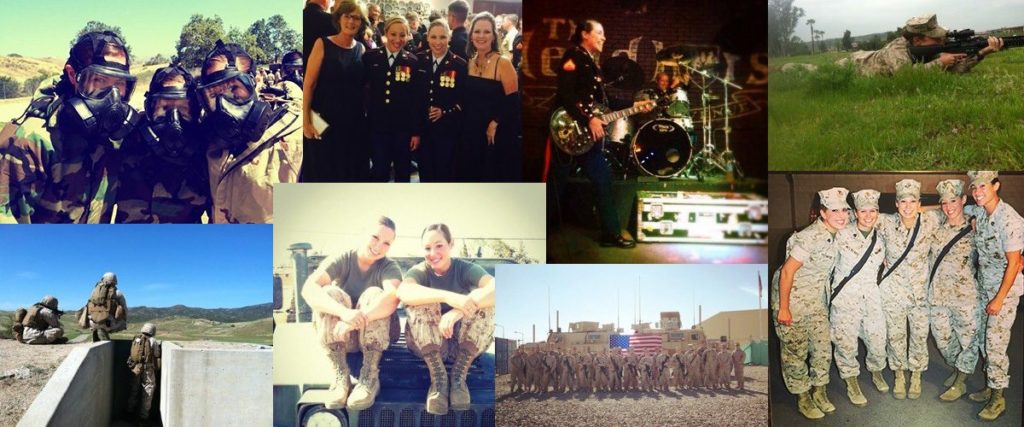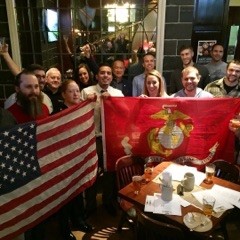Staying cool under fire helps Marine move into tech role

In 2012, Sergeant Solaire Sanderson was a signals intelligence analyst for the Marines Corps in Afghanistan when her base was infiltrated by the Taliban. She heard explosions and then watched on surveillance cameras as about 20 enemy combatants entered the base wearing bombing vests. “We knew they were headed to more populated areas to set the bombs off,” Sanderson recalls.
In these situations, Marines typically grab their weapons to repel the invaders. But her senior leader asked her to remain behind to keep doing the intelligence analysis needed to safeguard the base. “I wanted to go with them, to protect my friends and myself and our base,” Sanderson says. “I watched everyone walk out the door and didn’t know if I was going to see them again.” Then she realized that by staying back, she would see the big picture, track the immediate threats and gather information to lead her team as they worked to stop the attack.
Sanderson now uses that leadership experience and other skills gained from her military service in her role as a service engineer for Finance and Professional Services at Microsoft. After five years in the Marine Corps, Sanderson attended Microsoft Software & Systems Academy (MSSA), an intensive 18-week course that provides active duty U.S. service members at bases across the country with the career skills necessary to meet the IT industry’s high demand for talent. MSSA guarantees at least one interview with a technology company upon completion. Sanderson had 14 interviews and received seven job offers.

Rethinking her plans
Sanderson had never considered a tech career. In fact, she’d been planning to stay in the Marines until an injury forced her to rethink her future.
In April 2015, during a field exercise while stationed at Camp Pendleton, California, she performed an escape in an egress training while wearing a 70-pound pack and crushed bones in both her feet. She underwent two surgeries and had to remain inactive for nearly a year. “I loved the Marines, and I wasn’t ready to get out,” Sanderson says, “but after getting hurt, it hit me that I probably wasn’t going to be able to do this forever.”
Sanderson was almost ready for discharge when a friend told her about the MSSA program. “I’m always up for a new challenge,” she says. “I entered the course and absolutely fell in love with coding — and with Microsoft.”
She enjoyed the 8 a.m.–5 p.m., Monday through Friday structure of MSSA, which gave her plenty of dedicated time for her studies. “But it was a huge learning curve for me,” she says. Unlike many of her classmates she had no coding experience, so she had a lot of ground to cover. She learned C# and SQL, which she now uses on a daily basis, and transitioned from facility with military-speak to the acronyms and lingo that dominate the tech world.
Microsoft employees volunteer for MSSA to mentor participants in areas like resume writing, interviewing and translating their military experiences into corporate terms. Sanderson is grateful for the mentors who encouraged her strong points and helped her discover what direction she wanted to go in. “It was more than a class,” she says. “It was a transition program.”
Transition success
Newly acquired technical knowledge, combined with the leadership skills gained in the military, set Sanderson up to succeed in the private sector. Because she never knew what she would face the next day as a Marine, especially when deployed, she’d learned to take on whatever came her way with determination. “The military taught me how to be decisive, and I was able to take that from the Marine Corps into the private sector. In my new role, I’m always one of the first to take on a new project.”
Sanderson has found many other ways to apply her military training to the work she does now. For example, within her first few months on the job, Sanderson saw pockets of people working independently, getting work done but not always in the same way, which made it difficult to share knowledge across the team. Collaborating with a couple of teammates, Sanderson applied her military understanding of structure and procedure to create a process framework that all service engineers could easily follow, helping ensure that all work was done to the same standards.

A highly recommended program
Sanderson encourages service members to consider MSSA when they are planning to leave the military. “It’s hard to be used to putting on your uniform every single day and then snap your fingers one day and have all that be over,” she says. MSSA gives service members time to think about what they want to do when they get out — and perhaps discover a passion for technology they didn’t realize they had.
“The amount of knowledge I was able to gain, the opportunities they set you up with, the interviewing skills, resume prep — all those things made a huge difference in how I re-entered civilian life.”
Now Sanderson is busy making plans for the future. “In the long run, I still see myself working in cybersecurity,” she says. Meanwhile, she’s also preparing to work on her MBA and checking off all the Microsoft certifications she can get in her current role to continue learning and progress her career to the next level.
